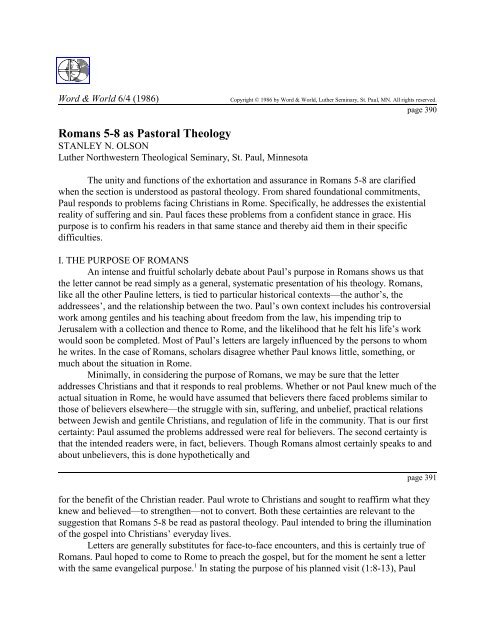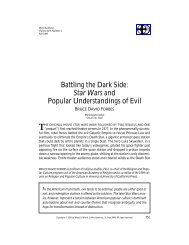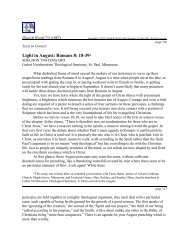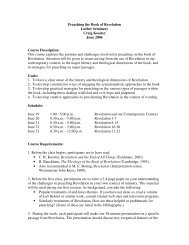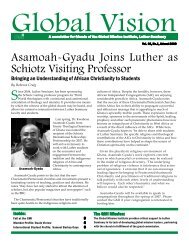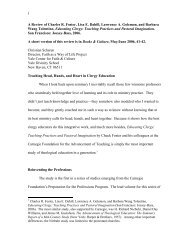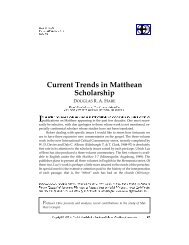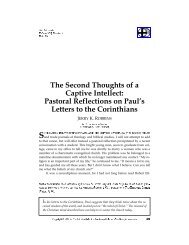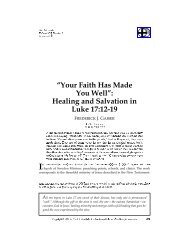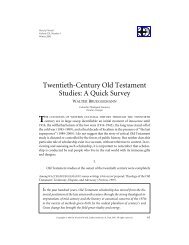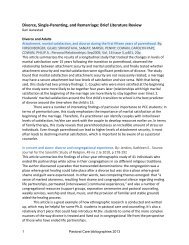Romans 5-8 as Pastoral Theology - Word & World - Luther Seminary
Romans 5-8 as Pastoral Theology - Word & World - Luther Seminary
Romans 5-8 as Pastoral Theology - Word & World - Luther Seminary
Create successful ePaper yourself
Turn your PDF publications into a flip-book with our unique Google optimized e-Paper software.
<strong>Word</strong> & <strong>World</strong> 6/4 (1986)Copyright © 1986 by <strong>Word</strong> & <strong>World</strong>, <strong>Luther</strong> <strong>Seminary</strong>, St. Paul, MN. All rights reserved.page 390<strong>Romans</strong> 5-8 <strong>as</strong> P<strong>as</strong>toral <strong>Theology</strong>STANLEY N. OLSON<strong>Luther</strong> Northwestern Theological <strong>Seminary</strong>, St. Paul, MinnesotaThe unity and functions of the exhortation and <strong>as</strong>surance in <strong>Romans</strong> 5-8 are clarifiedwhen the section is understood <strong>as</strong> p<strong>as</strong>toral theology. From shared foundational commitments,Paul responds to problems facing Christians in Rome. Specifically, he addresses the existentialreality of suffering and sin. Paul faces these problems from a confident stance in grace. Hispurpose is to confirm his readers in that same stance and thereby aid them in their specificdifficulties.I. THE PURPOSE OF ROMANSAn intense and fruitful scholarly debate about Paul’s purpose in <strong>Romans</strong> shows us thatthe letter cannot be read simply <strong>as</strong> a general, systematic presentation of his theology. <strong>Romans</strong>,like all the other Pauline letters, is tied to particular historical contexts—the author’s, theaddressees’, and the relationship between the two. Paul’s own context includes his controversialwork among gentiles and his teaching about freedom from the law, his impending trip toJerusalem with a collection and thence to Rome, and the likelihood that he felt his life’s workwould soon be completed. Most of Paul’s letters are largely influenced by the persons to whomhe writes. In the c<strong>as</strong>e of <strong>Romans</strong>, scholars disagree whether Paul knows little, something, ormuch about the situation in Rome.Minimally, in considering the purpose of <strong>Romans</strong>, we may be sure that the letteraddresses Christians and that it responds to real problems. Whether or not Paul knew much of theactual situation in Rome, he would have <strong>as</strong>sumed that believers there faced problems similar tothose of believers elsewhere—the struggle with sin, suffering, and unbelief, practical relationsbetween Jewish and gentile Christians, and regulation of life in the community. That is our firstcertainty: Paul <strong>as</strong>sumed the problems addressed were real for believers. The second certainty isthat the intended readers were, in fact, believers. Though <strong>Romans</strong> almost certainly speaks to andabout unbelievers, this is done hypothetically andpage 391for the benefit of the Christian reader. Paul wrote to Christians and sought to reaffirm what theyknew and believed—to strengthen—not to convert. Both these certainties are relevant to thesuggestion that <strong>Romans</strong> 5-8 be read <strong>as</strong> p<strong>as</strong>toral theology. Paul intended to bring the illuminationof the gospel into Christians’ everyday lives.Letters are generally substitutes for face-to-face encounters, and this is certainly true of<strong>Romans</strong>. Paul hoped to come to Rome to preach the gospel, but for the moment he sent a letterwith the same evangelical purpose. 1 In stating the purpose of his planned visit (1:8-13), Paul
acknowledged the <strong>Romans</strong>’ faith. The same must be said of the whole letter. It h<strong>as</strong> manycharacteristics of the type of argument the ancient rhetoricians called demonstrative orepideictic. 2 In such works the writer or speaker intends to lead the audience toward strongeradherence to certain truths which they already share. In <strong>Romans</strong> Paul aims to make possible thatsort of deepened commitment by addressing the readers’ actual situation. His purpose is p<strong>as</strong>toral.<strong>Romans</strong> w<strong>as</strong> written to nurture those who already believed.II. SUFFERING AND SINNING AS THE OCCASIONQuestions of a writer’s purpose must be answered by attention to what is said. <strong>Romans</strong> 5-8 makes it quite clear that Paul’s purpose there w<strong>as</strong> to address existential problems. 3Understandable interest in Paul’s theological views h<strong>as</strong> often led commentators and preachers totreat this material <strong>as</strong> though Paul discussed topics like the law <strong>as</strong> abstract theological problems.Paul’s concern here is with the twin problems of suffering and sinning. These experiences wereproblematic because they seemed to contradict convictions such <strong>as</strong> those stated in 1:16 and 4:24-25.Suffering is mentioned first. In 5:1-2 Paul begins with a great affirmation of peace andhope. Immediately he moves on to acknowledge the negative reality which heightens theaffirmation: “More than that, we rejoice in our sufferings (thlipsesin)” (5:3). Paul is facing thisreality when he <strong>as</strong>serts “...hope does not disappoint us” (5:5). That verse seems to allude to aPsalm, 22:5 or 25:3, which expresses <strong>as</strong>surance in the face of real suffering. Paul’s expression ofconfidence is concrete, not abstract. The same is true when he returns to the theme of suffering in8:18-39. He cites realistic experience <strong>as</strong> foils for his confidence: “the sufferings (pathemata) ofthis present time” (8:18), “in our weakness, for we do not know how to pray <strong>as</strong> we ought” (8:26),“tribulation, or distress, or persecution, or famine, or nakedness, or peril, or sword” (8:35).1Nils A. Dahl, “The Missionary <strong>Theology</strong> in the Epistle to the <strong>Romans</strong>,” Studies in Paul (Minneapolis:Augsburg, 1977) 70-88.2Wilhelm Wuellner, “Paul’s Rhetoric of Argumentation in <strong>Romans</strong>: An Alternative to the Donfried-KarrisDebate Over <strong>Romans</strong>,” The <strong>Romans</strong> Debate, ed. Karl Donfried (Minneapolis: Augsburg, 1977) 152-174. Cf.George Kennedy, New Testament Interpretation through Rhetorical Criticism (Chapel Hill: University of NorthCarolina, 1984) 152, and Robert Jewett, “Following the Argument of <strong>Romans</strong>,” supra, 383.3Treating <strong>Romans</strong> 5-8 <strong>as</strong> a unit needs little defense though there is some disagreement about the beginningpoint of the unit—5:1, 12 or 6:1. In favor of beginning at 5:1, see the argument of Nils A. Dahl, “A Synopsis ofRom. 5:1-11 and 8:1-39,” Studies in Paul, 88-90.page 392Although the language suggests concrete realities, the nature of the suffering is not fullydescribed. The precise relation of 5:1-5 and 5:6-11 is debated, but if the latter in any senseexplicates the former, it appears that suffering in 5:3 is understood partially in terms of weakness,sin, and alienation from God. The connection would suggest an experiential understanding of thelatter terms. Similarly, in 8:18-39 Paul links suffering with the circumstance of being part offallen and hopeful creation (8:19-25), with alienation from God (8:26-27), and with that whichdeserves condemnation (8:31-34). The list in 8:35 could refer to specific experiences such <strong>as</strong>Paul’s own but is more likely intended <strong>as</strong> general or typical of the Christian life. 4Suffering h<strong>as</strong> always troubled people of God. It seems to contradict their claim to God’sfavor. Paul shared this <strong>as</strong>sumption and deliberately set his confidence over against suffering such
<strong>as</strong> he and other Christians had experienced. Though we cannot know whether he w<strong>as</strong> thinking ofspecific times of persecution in Rome, we may be sure that he addressed the sorts of experiencehe <strong>as</strong>sumed the Roman Christians also had. Perhaps the general concreteness w<strong>as</strong> designed to letthe readers think of their own specifics, much <strong>as</strong> today’s preacher may use concrete but generalexamples in speaking to persons whose actual problems may be known only to themselves. Thecommon experience of suffering is part of the occ<strong>as</strong>ion for what Paul writes in Rom 5:1-11 and8:18-39.In the larger intervening unit, <strong>Romans</strong> 5:12-8:17, sin is the existential reality confronted. 5As we have seen, the p<strong>as</strong>sages which bracket this section address a suffering which includes sin.Law, death, and condemnation are important topics, but they were significant to Paul, his readers,and his opponents because Christians still experienced sin. The sinfulness of humanity is, ofcourse, a theme throughout <strong>Romans</strong>. After explaining his role and purpose (1:1-15), Paul stateshis theme (1:16-18), and then begins with an explication of the human situation without Christ.This is neatly summarized in 3:9: “all people, both Jews and Greeks, are under the power of sin.”In chapters 5-8 Paul faces the fact that Christians actually commit sins. Sin is the linking idea bywhich the Adam/Christ contr<strong>as</strong>t is introduced in 5:12. Adam is portrayed here not <strong>as</strong> primalhuman but <strong>as</strong> primal sinner. Sin remains a main topic under discussion throughout (e.g., 5:12;6:1, 15, 23; 7:7, 13, 24; 8:2, 12-13). Paul must have seen sinning <strong>as</strong> an existential problem forChristians though, of course, the matter is complex. Paul uses various terms which focus on sin<strong>as</strong> power or sin <strong>as</strong> transgressions. Sin is an element of the Christian’s p<strong>as</strong>t (5:8, 10, 12, 16), butthere is also a present inadequacy implied—salvation awaits (5:9, 10, 17, 19).The possibility of Christians continuing to sin is apparent in <strong>Romans</strong> 6; one does notadmonish against that which cannot happen. And it is Christians who sin. Paul nowhere impliesthat sinning is to be equated with falling from faith. Christians do sin, and that’s a problem—forPaul and for others. This4On suffering <strong>as</strong> the lot of the Christian, see Wayne Meeks, “The Social Context of Pauline <strong>Theology</strong>,”Interpretation 36 (1982) 273. The list in <strong>Romans</strong> 8:35 is also similar to Paul’s accounts of his apostolic difficulties(e.g., 1 Cor. 4:9-13; 2 Cor 6:4-10; 11:23-29), but the apostolic claim is apparently not emph<strong>as</strong>ized here.5Pauline vocabulary supports this. The various words for sin in <strong>Romans</strong>, especially those on the hamartstemare concentrated in 5:12-8:10.page 393chapter is often read <strong>as</strong> though Paul were responding to objections to his theology such <strong>as</strong> the onementioned in 3:8, “And why not do evil that good may come?—<strong>as</strong> some people slanderouslycharge us with saying.” 6 However, Paul’s argument in <strong>Romans</strong> 6 should not be read <strong>as</strong> a rebuttalof some who charged that his gospel promoted sinning, lawlessness. It is rather directed to anywho might have been inclined to use their freedom for sinning. He addressed the sinner, not thetheologian, if I may make such an artificial distinction. The problem Paul presumes here issimilar to what he encountered in Corinth. It is a practical problem, not a theoretical one. Hespeaks not to notions about sin, but to sins. If Paul w<strong>as</strong> addressing objections, they were notthose of an indignant critic of Paul’ s theology, but rather the thoughts of typical believerspuzzled or troubled by continued sin in themselves or others. 7 We are not told why sin w<strong>as</strong>considered a problem, but it would appear to conflict with the obvious sense of the <strong>as</strong>sertion thatGod justifies, makes righteous. That could cause the believer to doubt either the <strong>as</strong>sertion or its
application to a particular sinner. 8Chapter 7 is about the role of the law, but both by the context within 6:1-8:17 and by thecontent of his argument Paul reveals that sin is still the occ<strong>as</strong>ion for his writing. Sin dominatesthe law, rendering it ineffective or worse (7:8, 11, 13). Sin is discussed here both <strong>as</strong> humanexperience (7:5, 7, 8b, 15, 16, 19, 20a) and <strong>as</strong> a power over against the law and the person (7:8a,9, 11, 13, 17, 20b, 23, 25). Not only law but also the person is absolved of responsibility, and thefocus is placed on sin (7:7, 13, 17).The debate whether 7:13-25 speaks about the pre-Christian or the Christian situation willnever be settled to everyone’s satisfaction. While I agree with those who read this <strong>as</strong> Paul’sdescription of the life he and other Christians live, it is not necessary to hold that position inorder to see that the section addresses the problem of sin. 9 Is the Christian free from sin? In 7:25Paul leaves no doubt, “Thanks be to God through Jesus Christ our Lord!” But, even if chapter 7does not speak of a Christian experience of sin, it is closely tied to chapter 6 where believers areclearly susceptible. <strong>Romans</strong> 7 points to sin’s power and the ineffectiveness of the law andconcludes with the <strong>as</strong>surance of victory over sin. In 8:1-17 these themes are woven together. Sinis still the topic under discussion. Sinning is incompatible with life in the Spirit, and it isnecessary to admonish the Christian to avoid it.6For example, Calvin Roetzel, “Sacrifice in <strong>Romans</strong> 12-15,” 414, below; and N. A. Dahl, “Missionary<strong>Theology</strong>,” 84.7The form of the argument at 6:1-2, 15, objections and false conclusions, reflects a diatribal teachingtechnique rather than actual objections to Paul’s preaching. Stanley Stowers, The Diatribe and Paul’s Letter to the<strong>Romans</strong> (Chico, California: Scholars, 1981) 148-154.8It h<strong>as</strong> often been suggested that various parts of <strong>Romans</strong> are written to vindicate God, for example, in theface of continued unrighteousness or the unbelief of the Jews. Theodicy is part of Paul’s purpose in this letter, butthat does not appear to be the main point in <strong>Romans</strong> 5-8. There the focus is anthropological.9J. Christiaan Beker, Paul the Apostle: The Triumph of God in Life and Thought (Philadelphia: Fortress,1980) 107, usually gives careful consideration to context but seems to fail on this unit, calling it “an apology of thelaw.”page 394The existential question behind <strong>Romans</strong> 5-8 is, “How are we Christians to live with thereality of suffering and sin?” 10 Paul’s response to the problem is p<strong>as</strong>toral. He uses theology andexperience to <strong>as</strong>sure and admonish.III. THE STANCE OF THE CHRISTIAN<strong>Romans</strong> 5:2 speaks of a stance in grace, and the word is useful in describing how Paulargues in this section. In speaking p<strong>as</strong>torally to the <strong>Romans</strong>, Paul works from a stance in Christ“through whom we have obtained access to this grace in which we stand.” This stance is anattitude in both the sense of position or orientation and of mood or feeling. It involves theexperience of the whole person. “Peace with God” in 5:1 suggests both full reconciliation orcompatibility and the contentment or comfort which could accompany that. The words in 5:2-5translated <strong>as</strong> “rejoice,” “bo<strong>as</strong>t,” “endurance,” “character,” “confirmation” and “hope” similarlyhave objective and subjective components. <strong>Romans</strong> 8:38 should read, “For I am confident...,”and this clause too points to a complete orientation of the person. Throughout the section, evenwhere such words are not used, Paul’s stance is confident and <strong>as</strong>sured—the believer stands in a
ight relationship with God. 11 Like faith, to which it is closely linked, this stance is itself evidenceof God’s power, not human effort.It w<strong>as</strong> a standard rhetorical method in the ancient world, <strong>as</strong> it is today, to <strong>as</strong>sume theemotion or stance which one wished the audience to take. 12 Paul does this, for example, byspeaking confidently about himself and his God-given role when he wants his readers to granthim authority (e.g., Rom 1:16; 2 Cor 3:4, 12; 4:1, 7, 13). It w<strong>as</strong> common also in political oratoryfor the speaker to exude confidence in the nation or prince for whose cause support w<strong>as</strong> sought,or to express disgust or doubt about one who w<strong>as</strong> opposed.In Paul’s confident stance there is also something of the teacher/student relationshipwhich is always part of Paul’s apostolic self-understanding, “Become <strong>as</strong> I am. Imitate me.” Inchapters 6-7, when he responds to possible false conclusions, he uses the pedagogical style of thediatribe. 13 Demonstrative oratory, in general, is <strong>as</strong>sociated with an intent to instruct. In theopening and closing portions of this unit, Paul implies to his readers that they share his stance.He uses first person plural verbs and pronouns in 5:1-5 and in 8:31-39, except for “I amconfident” (pepeismai) (8:38) which also invites the reader to identify with the writer. FrequentlyPaul cites the knowledge he shares with the Roman Christians (e.g., 5:3; 6:6, 9; 7:14; 8:22, 28).10Krister 5tendahl, Paul Among Jews and Gentiles (Philadelphia: Fortress, 1976) 1-7, 131, rightIy objectsto reading <strong>Romans</strong> 1 <strong>as</strong> though Paul were answering the question, “How am I to find a gracious God?” But thissection is not adequately understood if one ignores the problem of sin and focuses only on the question of how theGentiles have a right to share in God’s promises.11Cf. C. E. B. Cranfield, A Critical and Exegetical Commentary on the Epistle to the <strong>Romans</strong>, (2 vols.;Edinburgh: T. & T. Clark, 1975-791.255) “The fact of our peace with God should be regarded <strong>as</strong> the subject whichgives the section <strong>as</strong> a whole its unity.” With a somewhat similar insight, J. Beker, Paul, 78, refers to the“confessional character of this section. He describes it <strong>as</strong> “the Christian community celebrating its new life inChrist.”12W. Wuellner, “Paul’s Rhetoric,” 163-164.13S. Stowers, Diatribe, 152-153.page 395Paul intends his argument throughout these chapters to strengthen the <strong>Romans</strong> for aconfident, Christian stance over against difficulty. Like other examples of demonstrative rhetoric,this letter intends to reaffirm and reinforce the ethos of its audience. The ethos of the Christiansis the tone and substance of the group’s entire range of values, notably including trust in God andobedience to God’s will. Ethos and world view interpenetrate and lend authority to each other. 14How God is understood influences the nature and depth of the believer’s trust and obedience.And one’s effective experience in trust and obedience affects how one views God. “Ought” and“is” are inseparable. Thus in <strong>Romans</strong> 5-8 Paul can argue toward his goal of intensifiedcommitment to the faith both by declarative <strong>as</strong>surances of what God h<strong>as</strong> done and byadmonitions about what God’s people will do. The power of this text is its potential to reaffirmconvictions which the reader already holds. That reaffirmation is seen by Paul <strong>as</strong> the answer tothe problems of suffering and sinning.Paul’s argument aims to strengthen group identity. He seeks to confirm the <strong>Romans</strong> intheir Christian stance by citing shared experience and shared beliefs. He uses familiar languagewhich incorporated common values and perceptions. 15 Drawing the community more closelytogether in its understanding and expression is a means of addressing the difficulties they would
experience.Paul refers to shared experiences both positive and negative. As we have seen, heacknowledges the reality of suffering and sin. He does not explain these away or play them down.Indeed, this negative experience is the occ<strong>as</strong>ion for his writing. Sin and suffering, the readerswould know, do not belong to the new aeon, so the continued experience of these is troubling.Paul’s argument both reinforces that perception—such experiences are alien to God’s will—andhelps the reader face these by putting them in perspective. Paul shows that the gospel, with itspattern of dying and rising, can acknowledge the evil without losing its power or promise.Positive experiences of God’s power are also data for Paul’s argument. In 6:3-11 the factof baptism is the b<strong>as</strong>is for reminding the readers of its significance, with the familiar language ofdeath and life. The experience of the Spirit is cited <strong>as</strong> the b<strong>as</strong>is for confidence about one’s stancewith God: “hope does not disappoint us, because God’s love h<strong>as</strong> been poured into our heartsthrough the Holy Spirit which h<strong>as</strong> been given to us” (5:5). “When we cry, ‘Abba, Father!’ it isthe Spirit itself bearing witness with our spirit that we are children of God” (8:15b-16). It isapparently also actual experience of the Spirit that Paul uses in 8:23, 26 to set against negativeexperiences—groaning with creation and inability to communicate with God. Paul says, in effect,“Yes, you have negative experiences, but the experience of God’s power in baptism and theSpirit is confirmation of your true status and hope.” These powerful symbols focus thecommunity on the nature and source of its identity.14J. H. Schütz, “Ethos of Early Christianity,” Interpreter’s Dictionary of the Bible: Supplementary Volume,ed. Keith Crim (N<strong>as</strong>hville: Abingdon, 1976) 289.15On the function of such language, see Norman Peterson, Rediscovering Paul: Philemon and theSociology of Paul’s Narrative <strong>World</strong> (Philadelphia: Fortress, 1985) 18-19.page 396The solution Paul offers for the existential problems of sin and suffering is b<strong>as</strong>ed, ofcourse, in the activity of God in Christ. Frequently in this section Paul uses summary <strong>as</strong>sertionsof that activity or other theological statements in his persu<strong>as</strong>ive effort. However one finallyoutlines this letter, 5:1 unavoidably reminds the reader of what proceeds—a discussion of God’snew act of justification in Christ. This is the b<strong>as</strong>is for the whole unit, chapters 5-8. In 5:6-11 Paulcites God’s act in Christ five separate times <strong>as</strong> b<strong>as</strong>is for confidence about the future. TheAdam/Christ contr<strong>as</strong>t in 5:12-21 reinforces the same point about the absolute significance ofChrist.The questions and responses of chapters 6 and 7 and the discussion of the Spirit’s work in8:1-17 draw out the meaning of God’s “righteousing” for Christian behavior. The overthrow ofsin means the opportunity for righteous living. The admonitions to acknowledge this reality areaccompanied by proclamation of it in terms which must have been familiar to Paul’s readers:so that <strong>as</strong> Christ w<strong>as</strong> raised from the dead by the glory of the Father, we too mightwalk in newness of life. (6:4b)Likewise, my brothers and sisters, you have died to the law through the body ofChrist, so that you may belong to another, to him who h<strong>as</strong> been raised from thedead in order that we may bear fruit for God. (7:4)Since the Spirit of him who raised Jesus from the dead dwells in you, he who
aised Christ Jesus from the dead will give life to your mortal bodies also throughhis Spirit which dwells in you. (8:11)By the inclusion of these theological <strong>as</strong>sertions, Paul’s admonitions lose any function <strong>as</strong>law. The old age of sin and law is totally incompatible with the new age of the Spirit andrighteousness. The exhortations become matters of Christian identity, reaffirming the stance ingrace. They are an invitation to live in acknowledgement that reality is changed. These<strong>as</strong>sertions, of course, were nothing new to the Roman Christians. Like several earlier p<strong>as</strong>sages,<strong>Romans</strong> 8:28 states the link between shared convictions and present circumstances: “We knowthat in everything God works for good with those who love God.” The emph<strong>as</strong>is is on God’saction for God’s own, including the addressees. It is summed up in 8:31: “If God is for us, whocan be against us!” The stance in Christ is solid, come what may. Paul uses positive experienceand theological <strong>as</strong>sertions to put suffering and sin in perspective.IV. CONCLUSIONSBy citing shared experiences and familiar beliefs, Paul does not give a response toexistential problems which is logically satisfying, <strong>as</strong> systematicians have long noted. But that w<strong>as</strong>not his goal. Paul’s purpose w<strong>as</strong> p<strong>as</strong>toral, not systematic. He intended to strengthen people intheir stance of faith, to reinforce the Christian ethos toward confidence and unity. Simply put,Paul saw the solution to the difficulties with sinning and suffering not in something new, like thelaw, but in something the believers already had—the gospel. They did not yet have fullexperience of God’s love; salvation, eternal life awaited them. Paul showed how that lack fits in,setting over against it the word of God’s p<strong>as</strong>t action in Christ’s death and resurrection. Beneathits opposite, grace is present. The argument ofpage 397<strong>Romans</strong> 5-8 helps the reader share the confident stance and future hope which Paul had alreadyestablished in the theme verse of the letter, “For I am not <strong>as</strong>hamed of the gospel, for it is thepower of God for salvation to all who believe” (1:16).This section can justly be called p<strong>as</strong>toral theology, for Paul w<strong>as</strong> seeking to proclaim thegospel of God’s love for specific kinds of situations. The goal is maintaining and deepening faith.The problem may be sin, suffering, or doubt. The method may be moral exhortation,proclamation of grace, or explanation and clarification. All rest in the conviction that reality isrightly experienced from the God-given stance in Christ. In <strong>Romans</strong> 5-8, the gospel serves tostrengthen believers for their daily lives in Christ.


